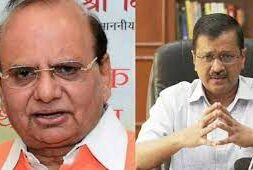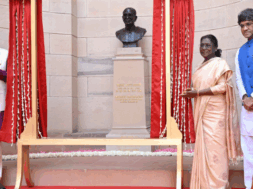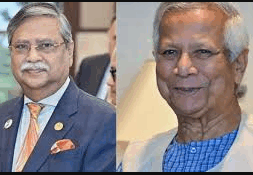
SC Refuses to Stay Delhi Services Ordinance But Agrees to Consider the Plea on July 17
Manas Dasgupta
NEW DELHI, July 10: The Supreme Court on Monday refused to stay the operation of the Delhi services ordinance but issued notices to the centre and the Delhi Lieutenant Governor for next hearing on the petition on July 17 when it said would also hear the pray for an interim stay of the ordinance.
A bench of the Chief Justice of India D Y Chandrachud and Justice P S Narasimha hearing a petition of the Delhi’s Aam Aadmi Party (AAP) government also allowed the petitioner to add the LG as a party to the petition which challenged the constitutional validity of the Centre’s order, the Government of National Capital Territory of Delhi (Amendment) Ordinance, 2023, (Impugned Ordinance) promulgated by the Centre on May 19, 2023, regarding control of services in the national capital.
Issuing notice on the Delhi government’s plea challenging the Constitutional validity of the Ordinance to the Centre and Lieutenant Governor, said the matter would have to be heard and added that it would consider the prayer for interim stay on July 17. Appearing for the AAP government, the senior advocate A M Singhvi pressed for a “qualified stay” but the bench refused to grant any without hearing both the sides in detail.
“We will issue notice to amend the petition to implead the Lieutenant Governor,” said CJI Chandrachud. In the next hearing on July 17, the court will also hear the Delhi government’s petition on the Lieutenant Governor sacking 400 specialists like fellows and research officers. The Lieutenant Governor is “acting like a super CM,” Delhi had told the court in its petition, filed shortly after the Centre passed the executive order last month. The Ordinance over-rides the Supreme Court order given barely a week ago that said only the elected government of Delhi was the boss.
Except for issues linked to land, police and public order, the Lieutenant Governor has “no independent decision-making powers” under the Constitution, the five-judge Constitution Bench led by Chief Justice Chandrachud had said in its order in May. The constitution bench had looked into whether the Central government has administrative control over transfers and postings of civil servants in the national capital.
The case had its roots in 2018, when the Arvind Kejriwal government had gone to court, arguing that its decisions were constantly being over-ridden by the Lieutenant Governor, who acts as the Centre’s representative in Delhi. Transfers and appointments of officials was one of the first flashpoints between Kejriwal’s government and the Lieutenant Governor.
Mr Kejriwal frequently complained that he could not appoint even a “peon” or transfer an officer. Bureaucrats didn’t obey his government’s orders as their cadre controlling authority was the Home Ministry, he also said.
Claiming that the Ordinance takes the powers away from elected representatives, the senior counsel said 437 independent consultants engaged by the Municipal Corporation of Delhi (MCD) had been fired by the LG.
He also referred to instances “where the SC had stayed an Act of Parliament, leave aside an Ordinance.”
If an Ordinance tries to nullify the pillar of a judgement of the court, the Court stays it, he added. “Can your Lordships imagine a meeting where a Chief Minister sits in a minority, two bureaucrats say… we believe prima facie this proposal is illegal. First, those two will outvote the CM. They will then refer it to the LG who is the super CM,” contended Singhvi.
He added that “the pillar of your (SC) judgment is civil service accountability to the executive… federalism, decentralisation, democratic government. You might not even have Article 239AA. It’s a serious issue. Therefore, either Your Lordships may consider stay or as a first step, stay the para of 437 independent consultants… fired by the LG… Give a qualified stay and call it on Friday… Their salary is stopped, they are stopped from working…”
Appearing for the Centre, Solicitor General Tushar Mehta said there are “some shocking facts.” “One of the persons removed is the wife of a sitting MLA. There are several party workers who were appointed without following the due process. I will have to place it on record,” he said, adding that the affected persons could always approach the high court.
Appearing for the LG, senior advocate Sanjay Jain said “the question is the minister is signing these Article 32 petition for and on behalf of the party workers who have put in those 400 positions and various such matters have been challenged before Delhi HC also. The affected person should go before the HC.”
The CJI, however, told Mehta, “You have a look at the prayer for interim relief… we will take it up on Monday (July 17).”
The AAP government plea which prayed for an immediate interim stay says the “Ordinance… completely sidelines the elected Government, i.e. the GNCTD, from control over its civil service.” “(It) wrests control over civil servants… from the GNCTD to the unelected Lieutenant Governor (LG),” the plea further states.
The ordinance, the plea adds, does so without seeking to amend the Constitution of India, in particular Article 239AA of the Constitution, from which flows the substantive requirement that power and control in respect of Services be vested in the elected government. The Delhi government termed the Ordinance “an unconstitutional exercise of executive fiat that… violates the scheme of federal, democratic governance entrenched for the NCTD in Article 239AA…”
The AAP-led government contended that it “is an impermissible and unconstitutional abuse of ordinance-making powers under Article 123 of the Constitution.”
It alleged that the “unseemly hurry in reversing” the SC ruling “via Ordinance, and the timing of its promulgation, reveals a conscious intent to avoid democratic as well judicial deliberations that could safeguard the interests of the people of Delhi.”
In its plea, the AAP government has said the ordinance was an “unconstitutional exercise of executive fiat” that attempts to “override” the top court and the basic structure of the Constitution. The AAP government also termed it as a “deception” with the Supreme Court verdict on control of services.














